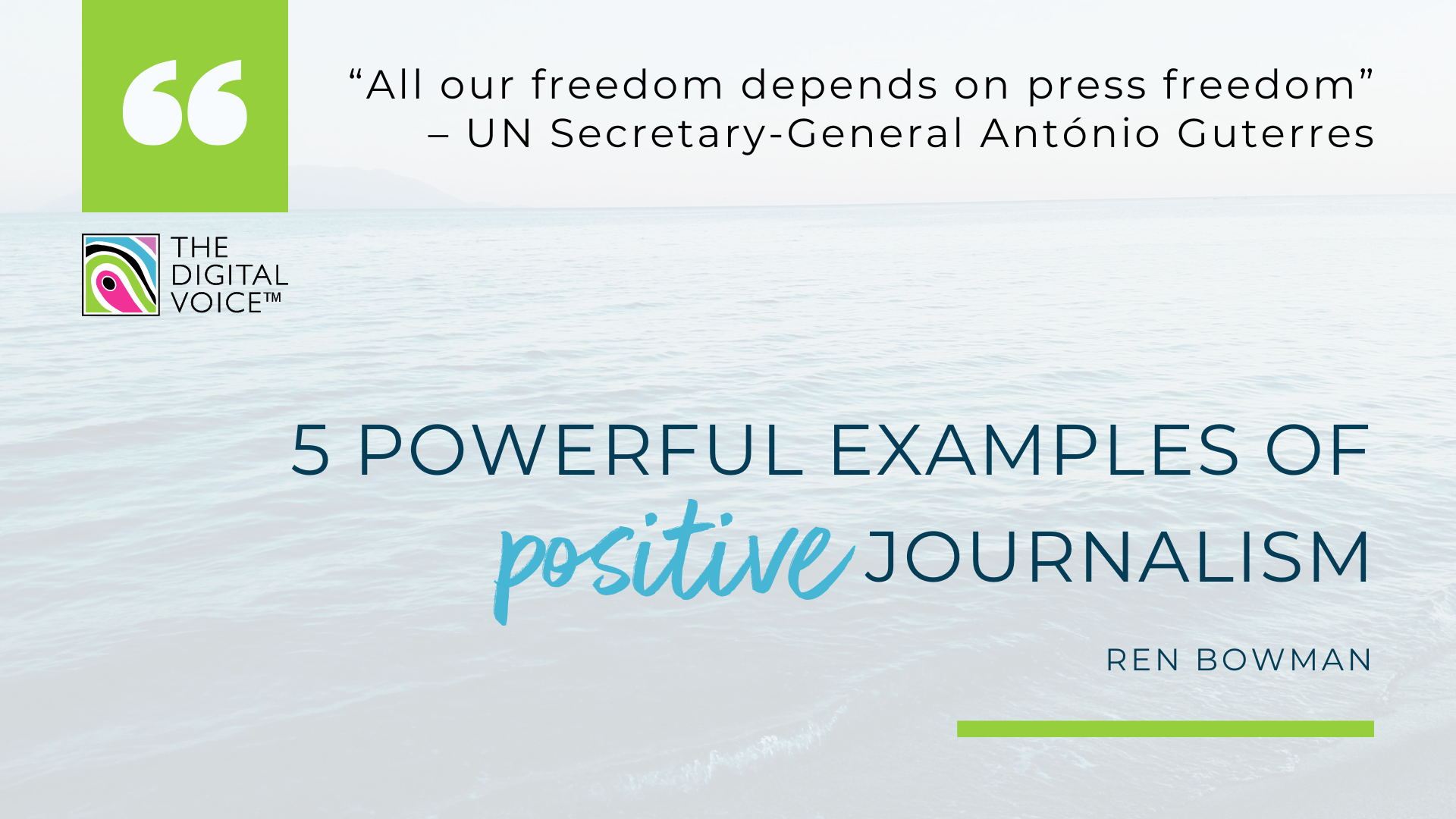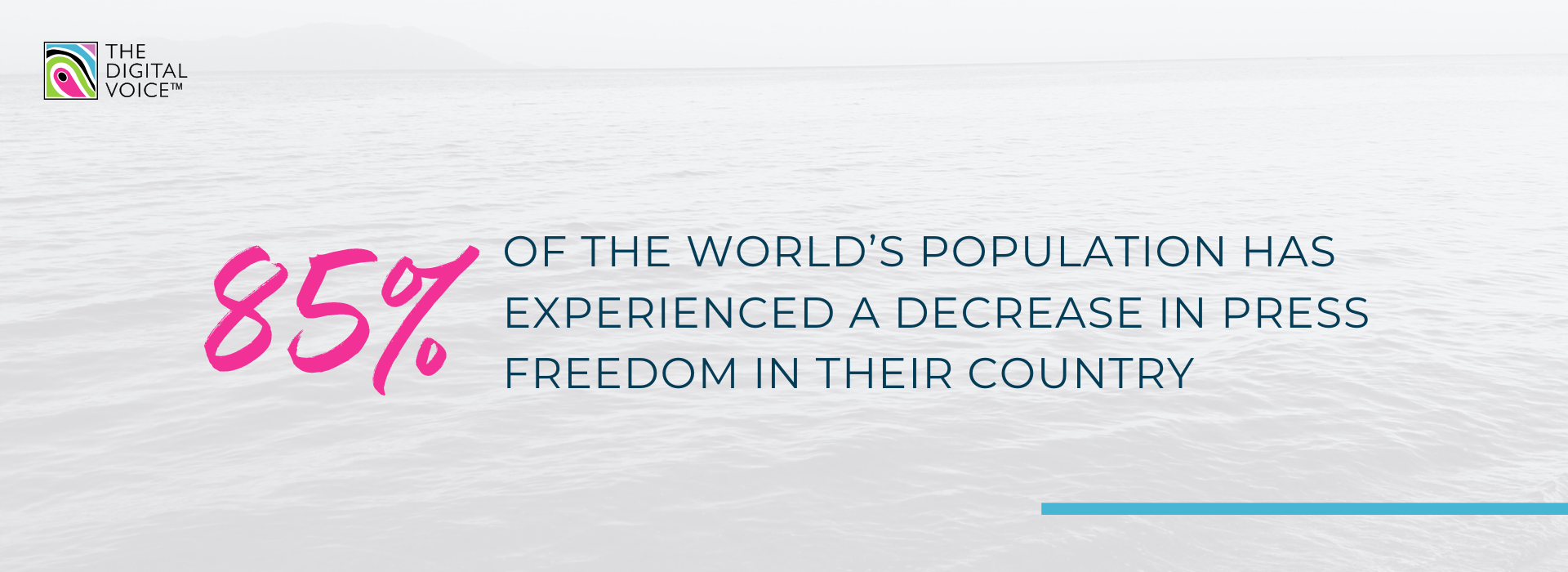5 Powerful Examples of Positive Journalism
by Ren Bowman

“All our freedom depends on press freedom” – UN Secretary-General António Guterres
As a PR agency, we’re acutely aware of the importance of press – day in and out, we’re working with our fantastic press partners across the industry and the globe. But freedom of speech and expression is something people often take for granted. After all, when you have it, you hardly notice it. It’s a privilege that passes under the radar until it gets taken away, but if you stop and think about it, where would we be without the freedom to share news and information however we need to? In the words of UN Secretary-General António Guterres, “All our freedom depends on press freedom”.
It sounds like something out of a dystopian novel, but the reality is that global press freedom is on a rapid decline. Ten years ago, the United Nations established an action plan on the Safety of Journalists to protect media workers and as of 2019, more than 100 countries have adopted freedom of information laws. And yet, over the past five years alone, 85% of the world’s population has experienced a decrease in press freedom in their country, with progress closing the gender gap in newsrooms and bylines stagnating and new laws and policies restricting freedom of expression online. That’s 96 out of 144 countries worldwide that have been affected.

The knock-on effects are plenty. The rise in data privacy laws can be largely attributed to a more careful approach to what information is permitted to be shared on the internet and the increasing lack of trust in worldwide media. But the good is few and far between, and the bad ranges from concerning to downright scary.
At the heart of the fight to maintain freedom of expression are independent journalists and activists, especially those working on modern, non-traditional platforms – Facebook Live and Youtube have become a battleground for press freedom in recent years, from the livestreaming of protests that aren’t covered by traditional news outlets to a place to spread advocacy and information. As social platforms fuel the fight against censorship, traditional media and investigative journalism continue to break through the carefully crafted portrayals in strategic communications and political theatre.
Here are five commendable stories that show the true power and positive impact of journalism in the last few decades.
#1 – Voice TV: Bringing Uncensored News in Thailand
Even in countries where traditional media faces government and self-censorship such as Thailand, digital publishing and social media have become the new benchmark for press freedom. Thai-run
Youtube channel Voice TV streams their popular show ‘Talking Thailand’ live at 7.30 am every morning, and nearly 2.6 million regular viewers tune in to listen to analysts and specialists list out the uncensored news of the day. It has become a staple of pro-democratic advocacy in a country with an extreme lese majeste law, that sees anyone who criticises the monarchy jailed for up to 15 years.
#2 – Barabanov and Ibrahim: Exposing Mercenary Activity
Investigative journalists Ilya Barabanov and Nader Ibrahim poured over a smashed tablet found on a Libyan battlefield
in a BBC report, gaining invaluable insight into Wagner, one of the world’s most secretive mercenary groups. Corroborating drone footage, civilian testimonies, and open-source evidence with equipment lists and military maps found on the tablet, Barabanov and Ibrahim uncovered and verified locations and government support for the military group which aided the launch of a legal investigation into Wagner.
#3 – Twohey and Kantor: Catalysing the #MeToo Movement
Journalists for The New York Times,
Megan Twohey and Jodi Kantor used their power as journalists to expose the predatory behaviour of Harvey Weinstein in the Hollywood film industry. This ended up catalysing the #MeToo movement and prompted countless women to find courage in the face of sexual abuse. Their work was able to thrust this important issue into public spotlight.
#4 - Süddeutsche Zeitung: Exposing the Elite
An anonymous member of German newspaper
Süddeutsche Zeitung exposed
‘The Panama Papers’, a leak of 11.5m files from the database of the world's fourth largest offshore law firm Mossack Fonseca. This leak displayed the ways in which the rich had been exploiting secretive offshore tax regimes which led to many of the world’s elites being caught for avoiding tax, including many world leaders and celebrities.
#5 - Sky News: Ringing the alarm bell on Amazon Deforestation
Journalists Victoria Elms, Kieran Devine, Carmen Aguilar Garcia, Larissa Johnsson, and Marcia Reverdosa for Sky News
released a report 2022 report on deforestation in the Amazon Rainforest, exposing hundreds of thousands in unpaid environmental fines and a dramatic 16% increase in land at risk in 12 months since President Jair Bolsonaro took control of the government in 2019. Bringing the news into public awareness, Sky helped put pressure on COP27, the 2022 UN climate change conference.
To continue exploring and investigating stories like these, and right down to the simplest sharing of information on social media, we need to defend press freedom.
Increase our access to information and tackle the spread of disinformation
Censorship is the enemy of expression, and so in reflection, authenticity and transparency must be viewed as the first steps in protecting it. There’s a careful balance between asking for transparency and believing everything you read is authentic, considering the rapid spread of misinformation, but it comes down to one simple agenda (in the famous words of Ronald Reagan): “Trust, but verify.”
Focus on strengthening privacy laws
Nearly three-quarters of all female journalists experienced online violence in the last 12 months. Privacy laws protect journalists, activists, and human rights advocates from the threat of digital surveillance and maintain legal protections over the information they share online.
Announce your commitment to protecting press freedom
Committing to the code of journalist ethics – reporting the truth, acting independently and minimising harm done – goes a long way, as does direct advocacy, increasing awareness of the issues press freedom is contending with. Signing open letters to governments and individuals who seek to restrict our access to information and free speech raises our collective voice against them. Donating to organisations such as the
Reporters’ Committee brings more resources to the fight against misinformation and censorship. If you want to know more about the issues press freedom is facing today, here are a selection of resources:
Statista – Press Freedom Overview
United Nations Press Freedom Statement 2023
European Centre for Press and Media Freedom
Reporters' Committee for Freedom of the Press
Journalism is empowerment – not just for the media workers but for all of us navigating the world educated by the information we consume. Protecting it needs to be a priority. This World Press Freedom Day and all others, journalists stand for the truth and the world must stand with them.



